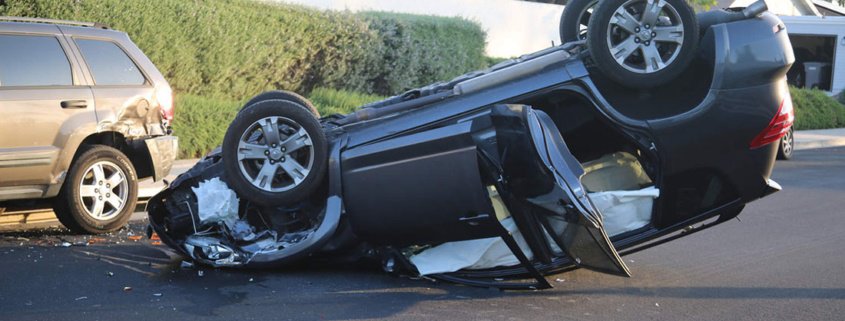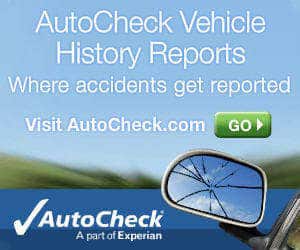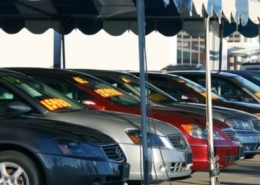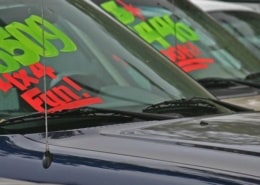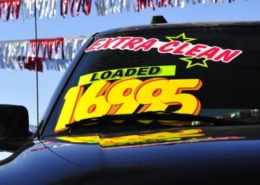What are Used Car Vehicle History Reports?
Buying a used car can be cheaper than buying a new car. However, to keep yourself from making a costly mistake, you should have the vehicle inspected by a professional mechanic and review the vehicle’s used vehicle history report to ensure you don’t purchase a car with underlying problems.
It’s not just accidents to worry about; thousands of vehicles are involved in natural disasters and floods. These vehicles are purchased for pennies on the dollar, rebuilt, and returned to a dealer’s lot for sale. If you don’t know what you’re looking at, you can buy one of these vehicles.
What is a Vehicle History Report?
A vehicle history report contains essential information about a used vehicle’s past. You can look at it like a vehicle’s report card.
A vehicle history report will show information about title records from the appropriate state’s Department of Motor Vehicles, along with any salvage, accident, and insurance total loss records.
Do You Really Need a Vehicle History Report?
The short answer is “YES!”
The reason is that there is no way for you to look at a used car and tell what the vehicle’s been through.
Today’s body shops do great work rebuilding a vehicle; there are some companies out there that all they do is buy insurance total loss cars, rebuild them and take them to other parts of the country to sell back to the general public. Reviewing a vehicle’s past upfront can keep you from buying someone else’s problems.
It’s not just previously wrecked vehicles to worry about; thousands of flood-damaged cars are on the road any day. These vehicles are purchased for pennies on the dollar, rebuilt, and returned to a dealer’s lot for sale to the general public. If you don’t know what you’re looking at, you can own one of these vehicles.
Many dealers provide a “free” report when you buy a car. They do this as a customer service representative hoping to put your mind at ease. Even if you’re offered one, I still recommend purchasing your own.
Many complaints have been filed and fines paid by dealers for creating false reports and providing outdated reports to consumers. This will not help you if you buy one of these bad cars.
My advice is to spend the money and avoid the situation altogether. The money you spend on the report may save you from losing thousands of dollars on a car. When you buy your report you will not have to worry about the information being tampered with.
Where Does the Vehicle History Come From?
There are several areas these companies collect data and information. Some of the information is provided by the Federal Government, and some better companies pay for the data they provide in their history reports.
Some of these data sources are:
- Insurance Companies
- Department of Motor Vehicles
- Car Dealerships
- Recycling Facilities
- Salvage Yards
- Auto Auctions
- Various other Independent Sources
You will also find police-reported accident information from all 50 states and the District of Columbia. They also collect data reported from the Federal Emergency Management Agency on storm-damaged vehicles and any vehicles registered in an area of major national disasters.
What’s Included in a Vehicle History Report?
There are four main areas a vehicle history report will focus on; these areas include:
- Title Check
- Odometer Check
- Problem Check
- Event and Use Check
This collected data will help you see and understand potentially important information on a used car you’re looking to buy. Depending on the information reported, it can tell you several different things about a used car:
- How many times the car has been titled
- If the vehicle has been used as a rental car or fleet vehicle
- If the car has been reported in an accident
- If the title has been reported as branded
- It tells you about the cars odometer history
- If the vehicle has ever been repossessed or stolen
- If there are any liens on the vehicle (great for private party sales)
- If the vehicle has ever been sold at auction
- Has the vehicle ever been recalled
- Has the car ever been damaged by fire, hail, floods, or involved in any other natural disasters
What Type of Vehicle History Report is the Best?
With several used car history report services online, deciding which one will give you the most value for your money can be challenging. I’ve personally pulled thousands of history reports; these companies can be broken down into two categories:
- Not recommended – Low-cost report providers that provide limited information gathered from the Federal Government National Motor Vehicle Title Information System (NMVTIS). I’ve used several of these companies to find out they’re missing valuable information when researching a car. Keep in mind; that there’s a reason they’re cheap!
- Recommended – Companies that will search out as much data as possible to provide you with the most information about the vehicle so you can make a good buying decision. These companies’ missions are to be the best history providers in the business and even guarantee the information provided on their reports.
I’ve used many of these services in my dealerships. Vehicle history reports protect me, my dealerships, and my customers from buying an unreliable car.
Reviewing a used car’s history report is not a requirement. However, it’s becoming more critical when uncovering underlying problems that are not visible to the naked eye.
Recommended Vehicle History Report Company
Most companies only allow you to buy one report at a time, or they will sell you a small package of just 3-5 reports. This will limit you if you’re browsing several vehicles at one time.
I recommend AutoCheck Vehicle History Reports, an Experian company. You may not have heard of them because they don’t advertise like the others.
Most major auto auctions and lenders use AutoCheck over their competitors because they are accurate in disclosing vehicles that have been rebuilt or branded with frame damage.
I suggest you spend a bit extra money and go for the Multiple Reports Package. It allows you to run 25 vehicle history reports for 21 days.
This will give you more than enough time to research and compare as many vehicles as needed to make a good buying decision. If you think you have to run more reports, you can opt for the Unlimited Package, which allows you to run unlimited reports for three weeks.
With the AutoCheck’s Multiple Report plan, you can even run history checks from your Smartphone, tablet, or iPad while you’re looking at vehicles on the dealer’s lot.
Have you just started car shopping and don’t have a used car’s VIN yet? There is an option where you can still get the Multiple Reports Package.
AutoCheck BuyBack Guarantee
One of the most valuable benefits of using AutoCheck to get a used car history report on your next used car is their Buyback Protection Guarantee; this is available at no extra cost. If a brand is found on a title after the vehicle is reported to be free of the brand, AutoCheck will provide coverage for what you paid for the car and will provide a refund of your purchase price.
They cover up to 110% of NADA published retail value if you find a covered title defect that also meets the terms and conditions of their guarantee. If they miss it, they’ll repurchase it.
Other Vehicle History Report companies will have a buyback guarantee available. What makes the AutoCheck Buyback program different from others is:
- Aftermarket items, including installed accessories and warranties, are covered up to $500.
- Experian is the company behind AutoCheck and will honor all current and future claims subject to the terms of the program.
No matter whom you go with when purchasing a vehicle history report. Always familiarize yourself with the terms and conditions of their “buyback guarantee.”
AutoCheck vs. The Competition
Companies such as CARFAX® advertise heavily on television and radio. I’ve used them along with AutoCheck in my dealerships. They are an excellent company and, like AutoCheck, provide a wealth of data and information.
For consumer use, this is why I recommend AutoCheck over the competition:
- Ability to scan multiple VINs on your Smartphone, tablet, or iPad.
- A single Used Car History Report under $30.
- Exclusive auction-announced frame damage from the two largest U.S auctions.
- No worry about canceling your “membership” or reoccurring charges on your credit card.
- Option to purchase unlimited vehicle history reports for $99.99.
- AutoCheck Score® is a number you can use to evaluate easily and compare multiple cars quickly.
- AutoCheck is owned by Experian, a trusted leader in providing consumers with tools to make the best financial and purchasing decisions.
- More than 13,000 auto dealers use AutoCheck over any other competitor for their used car history report provider.
AutoCheck Single Report Package
AutoCheck single report package
Single Report = $24.99
AutoCheck® vehicle history report
- One AutoCheck® vehicle history report
- Search by VIN or U.S. License Plate
- Includes access to dynamic vehicle data updates for 21 days
- One-time fee. No recurring charges.
Multiple Report Package (Best Value)
The multiple report package ( Best Value )
5 Reports for 21 Days – $49.99
AutoCheck® vehicle history reports
- 5 AutoCheck® vehicle history reports for 21 days
- No limit on vehicle searches by VIN or U.S. License Plate
- Includes access to dynamic vehicle data updates during the subscription term
- One-time fee. No recurring charges.
Additional Tips About Vehicle History Reports
Many new companies are sprouting up on the internet advertising cheap vehicle history reports as long as you become a member. These are very thin reports and do not include much information.
No reputable company will ask you to sign a membership or charge your credit card regularly.
I’ve received many emails about this and have been told it can be tough to cancel your membership.
Odometer Fraud and Tampering
Odometer fraud is another major problem in the United States and Canada. One of the easiest ways for an unethical car dealer to make big profits fast is to “roll back” an odometer. Remember, it’s not always the dealer’s fault; they may have bought the vehicle with the odometer already tampered with.
The introduction of digital odometers was supposed to make this impossible. However, it just made it easier for the scammers. The mileage is stored in the computer or brain of the car. A talented hacker can get in and roll back the vehicle’s mileage to increase its value. I’ve personally seen how easy it is to roll back an odometer on a car, and it is something you should be worried about.
Not only can a digital odometer be rolled back, but some scammers will also completely remove the dash panel and odometer and replace it with another that has less mileage. This can be done in only a few hours and is undetectable to the naked eye.
These unethical practices cost unsuspecting car buyers millions of dollars a year. A vehicle history report will tell you if the odometer has been tampered with and protect you from buying a car that has a rolled-backed odometer.
Natural Disasters
All you have to do is turn on the news to see another natural disaster somewhere in North America. Do you ever wonder where those vehicles end after a hurricane, tornado, wildfire, or flood? Most of them are salvaged, repaired, and back into circulation for car buyers like you.
During Hurricane Katrina, almost 600,000 vehicles were damaged by flood and debris. Insurance companies pay off the actual cash value of these cars to the owners and lien holders. The insurance companies then send them to auctions to recoup as much money as possible. Normally pennies on the dollar.
Companies such as shade tree mechanics, body shops, repair facilities, and even unethical dealers fix these cars and resale them to the public. I remember hundreds of these cars going through major auctions about 3 to 6 months after Katrina. Dealers and wholesalers attend these auctions to buy inventory for their dealerships. We had to be very careful, even as dealers, not to accept these cars. These vehicles slipped through the system, and many made it to car lots nationwide.
Another trick is to repair these vehicles and get them as far away as possible from where they were damaged. After Katrina, an automobile is less likely to be investigated if it is sold in California or, yes, even Canada. The short story is that you never know where a car will end up once it is repaired and placed back on the lot to sell.
Free VIN Checks Are Useless
A free VIN check lets you see how many records are attached to a vehicle. There may be only a few records tied to a car. Do not base your final decision on this information alone.
You want to review the vehicle’s complete history and detailed information before you commit to spending thousands of dollars. Again, I stress it will be money well spent.
No Vehicle History Report is Perfect
Purchasing a vehicle history report is not a substitute for having a used car inspected by a certified independent mechanic; it should be considered additional protection. Many fender benders never get reported to the proper authorities; hail damage often gets overlooked. A mechanic can tell you if the car has been in a wreck or it has been painted, no matter how small of a discrepancy it may have.
After checking the vehicle’s history and before you sign the papers to buy the car, take the vehicle to a mechanic of your choice. Tell the mechanic you’re looking to buy the car, and you’d like to know if he’d put it on a lift to see if the vehicle is a reliable car. Ask the mechanic if he would let his wife or daughter drive the vehicle? If he says yes, you know the car is in good shape.
A History Report is Not an Alternative
Two things you must do to protect yourself from buying a bad used car. Get an independent certified mechanic to inspect the vehicle and review a used vehicle history report. A vehicle history report is not an alternative to having the car inspected by an independent certified mechanic.
The report will tell you about the title (wrecked, flood-damaged, etc.), what the vehicle was used for, and the odometer history of a car. A certified mechanic will protect you from any mechanical or cosmetic defects of the car and will double-check to make sure what was reported is correct.

